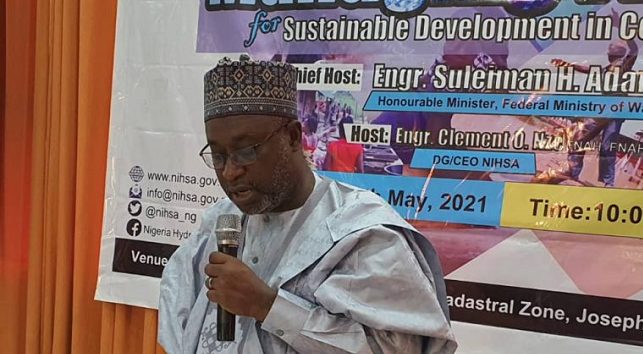The Minister of Water Resources, Mr Suleiman Adamu, has blamed the perennial scarcity of water on the refusal of states to plan for their growing population.

Adamu, who disclosed this at the sideline of a media parley in Abuja, said that it was worrisome that many states expected the Federal Government to take over the operation and maintenance of their water schemes.
According to him, it is not the duty of the Federal Government to take over these schemes, but to incentivise the states by making bulk water available in dams nationwide.
“The reason why we have been having this challenge of poor water supply is because there has not been proper planning by the state governments, their water schemes and interventions should always be ahead of the population growth.
“That is the only way they can be ahead of adequate water supply, even the issue of wear and tear, lack of proper operation and maintenance will see minimum operational capacity.
“Even if they are operating at proper capacity, that capacity is even half of the current population, that is why we keep advocating that states put all the incentives to use.’’
He said the present administration had a budget line of N2 billion to support states in urban water supply through an approval of the National Water Resources Policy by the Federal Executive Council in 2016.
“Apart from Gombe State, hardly has any state come forward because they had not met the requirements, no water supply master plan, and we put these conditions, not because we want to punish them, but because we want them to do the right thing.
“States need to put these things in place, we cannot just be giving out money when we are not sure that the money given will make the necessary impact.’’
He said it was worrisome that after the Federal Government had spent N6 billion on the Central Ogbia Water Scheme in Bayelsa, it became moribund.
Adamu said the ministry was not mandated to run water supply schemes, treat water and reticulate them, saying that, with any project completion, states must sign and adhere to protocols and guidelines.
The minister called for more commitment from states towards eliminating public defecation, saying that having only 76 open defecation-free local government areas in the country was unimpressive.
He said the ministry had trained and inaugurated 77,400 youth volunteers to act as hygiene ambassadors aimed at scaling up sanitation and hygiene in the country.
Adamu said the National Youth Volunteer Programme on Hand-washing was Federal Government’s intervention scheme to curb the spread of COVID-19 pandemic and end open defecation in the country.
According to him, the engagement of 100 youth volunteers in each of the 774 local government areas entailed community sensitisation and awareness creation on safe water, sanitation and hygiene practices.
The minister also pledged that the Federal Government would complete many of the abandoned water projects before the tenure of the present administration ends in 2023.
He noted that the government made a strategic decision to concentrate on completing many of the ongoing and abandoned projects it inherited.
It will be recalled that the ministry inherited more than 116 ongoing and abandoned water projects from previous administrations.
According to the minister, the projects, categorised into high, medium and low priority, were awarded as far back as 1992 and the early 2000s.
The minster said the abandoned projects, which included irrigation, dam and sanitation projects, had suffered neglect.
He said achieving food security was critical to the administration of President Muhammadu Buhari, stressing that an overall mandate that would end hunger was being pursued.
“Our plan was to complete 25 out of the abandoned projects before 2023, but it is not looking likely because of the economic situation.
“Even at that we are going to do what we are doing, we are keeping our eyes on the ball to finish as many of those inherited projects as possible, whether they are dams, irrigation or water supply.
“We have also done the study and design of other projects, especially in the irrigation sector, because this issue of food security is paramount to this administration.’’
On hydropower, the minister said that the government was working directly with investors because they were bankable projects that could pay for themselves.
He said that the designs have been completed for some of the irrigation projects.
Adamu said the ministry was hopeful that with availability of funds, it would complete the 6,600 hectares Donga-Suntai irrigation projects and the 6,000 hectares Nasarawa integrated irrigation project.
He added that a lot of progress had been made with the implementation of the World Bank-sponsored irrigation management programme, as it had seen massive transformation of old systems.
He said it was expected that at the end of the project in 2024, Nigeria would have had an additional 40,000 hectares of irrigable land.
On water supply, Adamu said the ministry had revived and inaugurated the Zobe water supply project, restructured Ota water supply project and the Zungeru-Wushishi water project.
“Ota water project was started in early 2000s. Zungeru-Wushishi was started in 1998 and we are putting it back on track. We are hopeful that this project will be completed this year or early 2023’’.
The minster added that the ministry was also supporting the completion of the Ilesha water supply project in Osun, saying the Federal Government’s component was almost 90 per cent completed.
By Tosin Kolade
